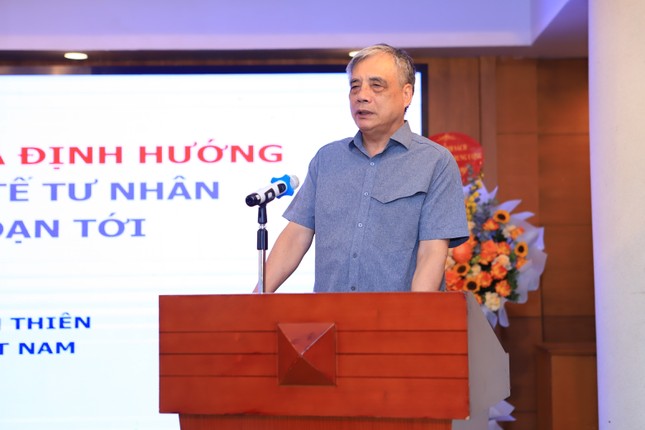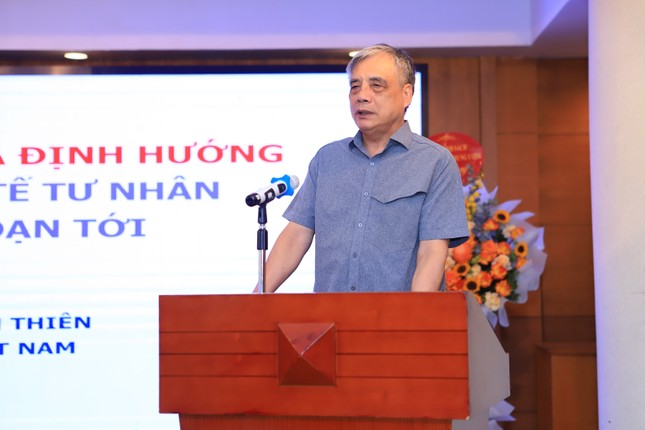Extraordinary efforts needed
Speaking at the workshop “Private sector as the most important driving force of the economy” held by the Vietnamese Private Entrepreneurs Association today (May 26) in Hanoi, Prof. Dr. Tran Dinh Thien assessed that the time when the private sector is entrusted with a great mission and high expectations is also when enterprises are facing many difficulties.
“Previously, for every two enterprises established, one withdrew, but now the ratio is almost 1-1. The fundamental problem lies in the challenging business environment. Enterprises are not only ‘slow to grow’ but also facing many challenges, exacerbating the abnormalities in general development and difficulties arising from the international context,” said Mr. Thien.

Prof. Dr. Tran Dinh Thien.
According to Prof. Dr. Tran Dinh Thien, extraordinary and outstanding efforts are needed, not only from enterprises but also from the State, in removing institutional barriers hindering development, including infrastructure, human resources, and legal framework; building a fair competitive environment, not biased in favor between economic sectors.
“More importantly, it’s not just about ‘unlocking’, but policies must also create conditions for private enterprises to rise to a new level,” said Thien, emphasizing the need to build and support the development of Vietnamese production chains, led by domestic economic groups, with the participation of Vietnamese enterprises.
Investment procedures are too complicated
Mr. Dau Anh Tuan – Deputy Secretary-General and Head of the Legal Department of the Vietnam Chamber of Commerce and Industry (VCCI) – said that, immediately after Resolution 68 was issued, VCCI reviewed the obstacles in the implementation process of investment projects. Accordingly, enterprises investing in projects using land must go through procedures from the implementation of general planning, subdivision planning, to approval of investment policies, selection of investors, land procedures, land leasing…
“The procedure is very complicated, involving at least 15 major procedures, along with many minor ones,” said Mr. Tuan, adding that enterprises often have to figure out many agencies, branches, and sectors by themselves. Each stage involves separate specialized fields, with the participation of many levels of government – from local to central.

Mr. Dau Anh Tuan – VCCI Deputy Secretary-General and Head of Legal Department.
According to the VCCI Secretary-General, many procedures can be reformed and adjusted immediately. “Recently, Prime Minister Pham Minh Chinh has spoken a lot about why we have detailed planning, have invested in industrial parks, and even had environmental impact assessments, but each project has to be handled from scratch. This is a procedural waste. The Prime Minister even mentioned that if there are specific standards, investors can implement them first, and the Government will supervise and inspect afterward,” said Mr. Tuan.
Recently, the Law Amending and Supplementing a Number of Articles of the Law on Investment has had special investment procedures, carried out according to the post-inspection procedure, where investors only need to have an investment consulting organization confirmed by the State and can be implemented, and the State can supervise with only a short procedure. However, this investment model, which is gradually being implemented, only applies to high-tech investors.
Mr. Tuan hopes that the regulations can be extended to other projects, especially in the production field of private enterprises.
Ms. Nguyen Thi Nga – Vice President of the Vietnamese Private Entrepreneurs Association, Chairwoman of BRG Group – expressed: “Private enterprises expect consistency in policies so that we don’t have to worry, will there be any documents or regulations in the next 10 years that will have to be reviewed? Entrepreneurs are ready to dedicate their heart and soul, but they need peace of mind that they are doing the right thing and following the right guidance, in line with Resolution 68.”
The Private Enterprise: Facing the Stark Reality of 1:1 Birth-Death Ratio
“The business landscape is ever-evolving, and as PGS.TS Tran Dinh Thien, former Director of the Vietnam Economic Institute, aptly pointed out, the challenges faced by businesses are mounting. In the past, for every two businesses that started, one would withdraw. Now, the ratio has evened out to a near 1-to-1 ratio, indicating a more challenging business environment. This underscores the need for businesses to navigate these hurdles and forge ahead with resilience and innovation.”
A Transparent Business Environment: Unlocking Opportunities and Raising Expectations
Resolution 68-NQ/TW of the Political Bureau on the Development of the Private Economy (Resolution 68) is expected to be a historic turning point, ushering in a robust growth phase for Vietnam’s private sector. To realize this immense potential, a prerequisite is to establish an extremely conducive, transparent, and predictable business and investment environment.
A Bold Reform Proposal: Slashing Processing Time from 300 to 75 Days to Revitalize Social Housing Projects
“The current process of selecting a social housing project investor through a tender process takes an average of 300 days, a lengthy and cumbersome procedure. However, with the implementation of proposed reforms, this duration can be significantly reduced to just 75 days. This radical transformation will not only streamline the process but also open up opportunities for efficient and effective project development, ensuring timely delivery of much-needed social housing initiatives.”
Anxious Delegates Confront a ‘Jungle of Red Tape’ Stifling Business
The current bureaucratic red tape is stifling our ability to attract private investment and drive growth. This is the opinion of several members of parliament, who believe that the excessive and cumbersome procedures are hindering the country’s economic potential.





















